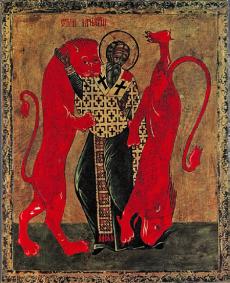![]() Meeting the World: Taking the Gospel Into Our Times and Places is a series about Orthodox Christian engagement with the surrounding culture.
Meeting the World: Taking the Gospel Into Our Times and Places is a series about Orthodox Christian engagement with the surrounding culture.
It was originally presented by Fr. Andrew Stephen Damick on Dec. 4, 2011 to Jan. 15, 2012.
- I. Meeting the World: Taking the Gospel Into Our Times and Places: Part 1, Part 2
- II. A Peculiar People: Orthodox Christian Identity in a Hostile World: Part 1, Part 2
- III. A Divine Ecology: An Orthodox Christian Vision for the Environment: Part 1, Part 2
- IV. The Transfiguration of Place: An Orthodox Christian Vision of Localism: Part 1, Part 2
- V. Doctrine Matters: Why Orthodoxy Isn’t Just Orthopraxy: Part 1, Part 2
 Voice from Antioch: An Ignatian Catechism: Major themes in Orthodox Christianity from the writings of St.
Voice from Antioch: An Ignatian Catechism: Major themes in Orthodox Christianity from the writings of St.
 On March 3, 2012, a retreat on Orthodox Church Music was held at St. Paul’s, featuring Richard Barrett, Liturgical Musician and Scholar and Artistic Director of the
On March 3, 2012, a retreat on Orthodox Church Music was held at St. Paul’s, featuring Richard Barrett, Liturgical Musician and Scholar and Artistic Director of the  An outreach seminar led by Prof. Alfred Siewers of Bucknell University (Assoc. Prof. of Medieval Literature, Coordinator of the Nature and Human Communities Initiative), originally presented on November 21, 2009.
An outreach seminar led by Prof. Alfred Siewers of Bucknell University (Assoc. Prof. of Medieval Literature, Coordinator of the Nature and Human Communities Initiative), originally presented on November 21, 2009.